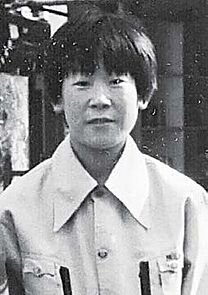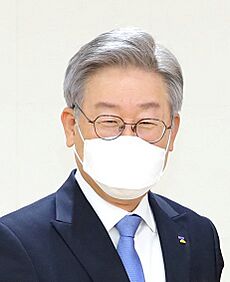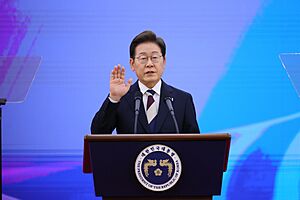Lee Jae Myung facts for kids
Quick facts for kids
Lee Jae Myung
|
|
|---|---|
|
이재명
|
|
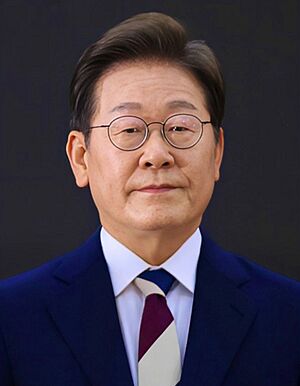
Lee in 2025
|
|
| 14th President of South Korea | |
| Assumed office 4 June 2025 |
|
| Prime Minister |
|
| Preceded by |
|
| Leader of the Democratic Party | |
| In office 28 August 2022 – 9 April 2025 |
|
| Preceded by | Woo Sang-ho |
| Succeeded by | Park Chan-dae (acting) |
| Member of the National Assembly | |
| In office 2 June 2022 – 4 June 2025 |
|
| Preceded by | Song Young-gil |
| Succeeded by | Vacant |
| Constituency | Gyeyang B (Incheon) |
| Governor of Gyeonggi Province | |
| In office 1 July 2018 – 25 October 2021 |
|
| Preceded by | Nam Kyung-pil |
| Succeeded by |
|
| Mayor of Seongnam | |
| In office 1 July 2010 – 15 March 2018 |
|
| Preceded by | Lee Dae-yup |
| Succeeded by | Eun Su-mi |
| Personal details | |
| Born | c. 8 December 1963 Andong, South Korea |
| Political party | Democratic (since 2014) |
| Other political affiliations |
|
| Spouse |
Kim Hea Kyung
(m. 1991) |
| Children | 2 |
| Education | |
| Occupation |
|
| Signature | |
| Korean name | |
| Hangul |
이재명
|
| Hanja |
李在明
|
| RR | I Jaemyeong |
| MR | I Chaemyŏng |
| IPA | [i.dʑɛ.mjʌŋ] |
Lee Jae Myung (born around 8 December 1963) is a South Korean politician and lawyer who is the 14th President of South Korea. He is a member of the Democratic Party of Korea (DPK). He was the leader of the party from 2022 to 2025.
Lee was born into a poor family. He could not go to middle school and instead worked in a factory. An accident at work left him with a permanent disability. Despite this, he studied hard to pass his school exams and went to Chung-Ang University, where he earned a law degree. He became a lawyer who fought for human rights and workers' rights.
He entered politics in 2005. He was elected mayor of Seongnam in 2010 and again in 2014. Later, he became the governor of Gyeonggi Province from 2018 to 2021. In 2022, he ran for president but narrowly lost to Yoon Suk Yeol.
In January 2024, Lee survived an attack where he was stabbed in the neck. Later that year, during a crisis where the president declared martial law, Lee gained attention by climbing a fence to enter the National Assembly building. He helped lead the effort to impeach President Yoon. After Yoon was removed from office, Lee ran for president again in 2025 and won.
Contents
Early Life and Education
Lee Jae Myung was born in Andong, South Korea. He was the fifth of seven children in a poor family. Because his family did not have much money, he often missed out on school activities like field trips.
After elementary school, his family lost their savings and had to move to find work. At that time, middle and high school were not free in South Korea, so Lee could not continue his education.
Working as a Child
Lee's family moved to Seongnam, a city built for industry near Seoul. Instead of going to middle school, Lee started working in factories. He was too young to work legally, so he used different names.
While working, he had two serious accidents. The first one injured his finger. In the second accident, a machine crushed his wrist. This injury was not treated properly and resulted in a permanent disability in his arm. Because of this, he did not have to serve in the military.
Seeing other students in their school uniforms inspired him to study again. He took special classes and passed exams to earn his middle and high school diplomas. Lee has said that growing up in poverty shaped his belief in helping the weak and controlling the power of the strong.
Becoming a Lawyer
Lee did so well on his entrance exams that he earned a scholarship to study law at Chung-Ang University. After graduating in 1986, he passed the bar exam to become a lawyer.
At first, he wanted to be a judge or a prosecutor. However, he was inspired by a speech from Roh Moo-hyun (who later became president) to become a human rights lawyer instead. He opened his own law office in Seongnam and worked to help workers and others in need.
In the early 2000s, Lee led a movement to build a new public hospital in Seongnam after two others had closed. When the city council quickly rejected the idea, Lee and his group protested. This experience made him realize that to make big changes, he needed to enter politics.
Political Career
Mayor of Seongnam
In 2010, Lee was elected mayor of Seongnam. He promised to make the city a place where all citizens had equal opportunities. One of his first actions was to turn the large mayor's office into a public book cafe.
He focused on improving the city's welfare programs. He provided funding for the Seongnam Medical Center and started a program to give free school uniforms to students. He also created a "youth dividend," which gave a basic income to young people in the city.
As mayor, Lee was also known for his work on animal rights. He helped shut down facilities in Moran Market where dogs were slaughtered. He was re-elected as mayor in 2014.
Governor of Gyeonggi Province
In 2018, Lee was elected governor of Gyeonggi Province, a large and populated area around Seoul. As governor, he became well-known for how he handled the COVID-19 pandemic.
When a major outbreak happened in early 2020, Lee took strong actions to trace infections and get people tested. He also ordered all foreign workers in the province to be tested for the virus, which helped find hundreds of new cases.
He also planned to give COVID-19 relief money to all residents of Gyeonggi Province. He resigned as governor in October 2021 to run for president.
National Politics
After losing the 2022 presidential election, Lee was elected to the National Assembly in June 2022. In August, he became the leader of the Democratic Party.
Attack in 2024
On January 2, 2024, a man stabbed Lee in the neck while he was talking to reporters in Busan. Lee was conscious but bleeding and was rushed to the hospital. The attacker was arrested at the scene. The wound was serious, but Lee survived the attack.
2024 Martial Law Crisis
In December 2024, President Yoon Suk Yeol suddenly declared martial law, which is when the military takes control of the government. Soldiers were sent to stop the National Assembly from meeting.
Lee refused to be stopped. He livestreamed himself on YouTube as he climbed over the fence of the National Assembly building to get inside. He called on people to protest the president's actions. The martial law was quickly lifted, and Lee then led the effort to impeach President Yoon for treason. Yoon was removed from office by the National Assembly on December 14.
Presidential Campaigns
Lee has run for president three times.
- 2017: Lee ran for the Democratic Party's nomination but came in third place. Moon Jae-in won the nomination and later became president.
- 2022: Lee won the party's nomination and ran for president. He focused on policies to create equality and improve South Korea's role in the world. He lost the election by a very small margin to Yoon Suk Yeol.
- 2025: After President Yoon was impeached, a new election was held. Lee ran again and won, becoming the 14th President of South Korea on June 3, 2025.
Presidency (2025–present)
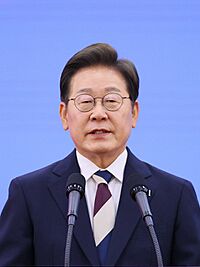 |
|
|
Presidency of Lee Jae Myung
|
|
|---|---|
| 4 June 2025 – present | |
| Premier | Lee Ju-ho (acting) Kim Min-seok |
| Cabinet | Full list |
| Party | Democratic |
| Election | 2025 |
| Seat | Seoul |
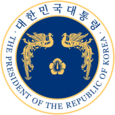 |
|
Lee Jae Myung was sworn in as president on June 4, 2025. His inauguration ceremony was held inside the National Assembly building.
In his first days as president, he began appointing people to his cabinet, including Kim Min-seok as Prime Minister. He also ordered the government to move the headquarters of the Ministry of Oceans and Fisheries to Busan, which was one of his campaign promises.
President Lee is currently working from the Yongsan Presidential Office. He plans to eventually move the presidential office back to its former location at Cheong Wa Dae. His first international trip as president was to Canada for the 51st G7 summit.
Political Ideas
Lee's political ideas are generally considered center-left. He supports a strong government role in the economy to help create growth and fairness.
Economy and Society
Lee believes that many of South Korea's problems come from slow economic growth and unfairness. He supports policies like a "Green New Deal" to fight climate change and a digital transformation to modernize the economy.
One of his most famous ideas is universal basic income (UBI). This means giving a regular amount of money to all citizens. As mayor and governor, he started small basic income programs for young people and farmers. He plans to expand this to all citizens to help reduce poverty and inequality.
Foreign Policy
Lee's foreign policy focuses on practical benefits for South Korea.
- North Korea: He supports peace talks and continuing the Sunshine Policy, which aims to build better relations with North Korea through cooperation.
- United States: He sees the U.S. as South Korea's most important ally and supports strong trade and military ties.
- China: He views China as an important partner for trade but has also criticized the country on cultural issues.
- Japan: He wants to improve economic and social ties with Japan but also wants to deal firmly with historical disagreements between the two countries.
Personal Life
Lee married Kim Hea Kyung in 1991. They have two sons. Lee has a disability in his arm from a factory accident when he was a teenager.
Images for kids
Electoral history
| Party | Candidate | Votes | % | ||
|---|---|---|---|---|---|
| Grand National | Lee Dae-yup | 177,531 | 54.0 | ||
| Uri | Lee Jae Myung | 78,059 | 23.8 | ||
| Democratic | Jang Yeong-ha | 38,144 | 11.6 | ||
| Democratic Labor | Kim Mi-hee | 34,909 | 10.6 | ||
| Total votes | 331,884 | 100.0 | |||
| [[Grand National Party|Template:Grand National Party/meta/shortname]] hold | |||||
| Party | Candidate | Votes | % | ||
|---|---|---|---|---|---|
| Grand National | Ko Heong-gil | 46,396 | 64.7 | ||
| UDP | Lee Jae Myung | 23,822 | 33.2 | ||
| PUFP | Choi Jeong-hwan | 1,455 | 2.0 | ||
| Total votes | 72,490 | 100.0 | |||
| [[Grand National Party|Template:Grand National Party/meta/shortname]] hold | |||||
| Party | Candidate | Votes | % | |
|---|---|---|---|---|
| Democratic | Lee Jae Myung | 201,047 | 51.2 | |
| Grand National | Hwang Joon-gi | 169,510 | 43.1 | |
| Independent | Lee Dae-yup | 22,360 | 5.7 | |
| Total votes | 397,878 | 100.0 | ||
| Democratic gain from Grand National | ||||
| Party | Candidate | Votes | % | ||
|---|---|---|---|---|---|
| NPAD | Lee Jae Myung | 239,685 | 55.1 | ||
| Saenuri | Shin Yeong-su | 191,749 | 44.0 | ||
| The New Politics | Heo Jae-ahn | 3,901 | 0.9 | ||
| Total votes | 448,996 | 100.0 | |||
| style="background-color: Template:New Politics Alliance for Democracy/meta/color" | | [[New Politics Alliance for Democracy|Template:New Politics Alliance for Democracy/meta/shortname]] hold | ||||
| Party | Candidate | Votes | % | |
|---|---|---|---|---|
| Democratic Party (South Korea, 2015) | Lee Jae Myung | 3,370,621 | 56.4 | |
| Liberty Korea | Nam Kyung-pil | 2,122,433 | 35.5 | |
| Bareunmirae | Kim Young-hwan | 287,504 | 4.8 | |
| Justice | Lee Hong-woo | 151,871 | 2.5 | |
| Minjung | Hong Sung-kyu | 43,098 | 0.7 | |
| Total votes | 5,975,527 | 100.0 | ||
| Democratic Party (South Korea, 2015) gain from Liberty Korea | ||||
| Party | Candidate | Votes | % | |
|---|---|---|---|---|
| People Power | Yoon Suk Yeol | 16,394,815 | 48.56 | |
| Democratic Party (South Korea, 2015) | Lee Jae Myung | 16,147,738 | 47.83 | |
| Justice | Sim Sang-jung | 803,358 | 2.38 | |
| National Revolutionary | Huh Kyung-young | 281,481 | 0.83 | |
| Progressive | Kim Jae-yeon | 37,366 | 0.11 | |
| Our Republican | Cho Won-jin | 25,972 | 0.08 | |
| Basic Income | Oh Jun-ho | 18,105 | 0.05 | |
| Korean Wave Alliance | Kim Min-chan | 17,305 | 0.05 | |
| Korean Unification | Lee Gyeong-hee | 11,708 | 0.03 | |
| Labor | Lee Baek-yun | 9,176 | 0.03 | |
| New Liberal Democratic Union | Kim Gyeong-jae | 8,317 | 0.02 | |
| Saenuri | Ok Un-ho | 4,970 | 0.01 | |
| Total votes | 33,760,311 | 100.00 | ||
| People Power gain from Democratic Party (South Korea, 2015) | ||||
| Party | Candidate | Votes | % | ||
|---|---|---|---|---|---|
| Democratic Party (South Korea, 2015) | Lee Jae Myung | 44,289 | 55.24 | ||
| People Power | Yoon Hyeong-seon | 35,886 | 44.75 | ||
| Total votes | 80,175 | 100.0 | |||
| style="background-color: Template:Democratic Party (South Korea, 2015)/meta/color" | | [[Democratic Party (South Korea, 2015)|Template:Democratic Party (South Korea, 2015)/meta/shortname]] hold | ||||
| Party | Candidate | Votes | % | ||
|---|---|---|---|---|---|
| Democratic Party (South Korea, 2015) | Lee Jae Myung | 48,365 | 54.12 | ||
| People Power | Won Hee-ryong | 40,616 | 45.45 | ||
| Tomorrow, Future | Choi Chang-won | 372 | 0.41 | ||
| Total votes | 89,354 | 100.0 | |||
| style="background-color: Template:Democratic Party (South Korea, 2015)/meta/color" | | [[Democratic Party (South Korea, 2015)|Template:Democratic Party (South Korea, 2015)/meta/shortname]] hold | ||||
| Party | Candidate | Votes | % | |
|---|---|---|---|---|
| Democratic Party (South Korea, 2015) | Lee Jae Myung | 17,287,513 | 49.42 | |
| People Power | Kim Moon-soo | 14,395,639 | 41.15 | |
| Reform Party (South Korea) | Lee Jun-seok | 2,917,523 | 8.34 | |
| Justice | Kwon Yeong-guk | 344,150 | 0.98 | |
| Independent | Song Jin-ho | 35,791 | 0.10 | |
| Total votes | 35,236,497 | 100.00 | ||
| Democratic Party (South Korea, 2015) gain from People Power | ||||
Primary election
| Party | Candidate | Votes | % | |
|---|---|---|---|---|
| Democratic Party (South Korea, 2015) | Moon Jae-in | 936,419 | 57.0 | |
| Democratic Party (South Korea, 2015) | Ahn Hee-jung | 353,631 | 21.5 | |
| Democratic Party (South Korea, 2015) | Lee Jae Myung | 347,647 | 21.2 | |
| Democratic Party (South Korea, 2015) | Choi Sung | 4,943 | 0.3 | |
| Total votes | 1,642,677 | 100.0 | ||
| Party | Candidate | Votes | % | |
|---|---|---|---|---|
| Democratic Party (South Korea, 2015) | Lee Jae Myung | 719,905 | 50.3 | |
| Democratic Party (South Korea, 2015) | Lee Nak-yeon | 560,392 | 39.1 | |
| Democratic Party (South Korea, 2015) | Choo Mi-ae | 129,035 | 9.0 | |
| Democratic Party (South Korea, 2015) | Park Yong-jin | 22,261 | 1.6 | |
| Total votes | 1,431,593 | 100.0 | ||
| Party | Candidate | Votes | % | |
|---|---|---|---|---|
| Democratic Party (South Korea, 2015) | Lee Jae Myung | 623,695 | 89.8 | |
| Democratic Party (South Korea, 2015) | Kim Dong-yeon | 41,307 | 6.9 | |
| Democratic Party (South Korea, 2015) | Kim Kyoung-soo | 25,512 | 3.4 | |
| Total votes | 690,514 | 100.0 | ||
See also
 In Spanish: Lee Jae-myung para niños
In Spanish: Lee Jae-myung para niños
 | William Lucy |
 | Charles Hayes |
 | Cleveland Robinson |


